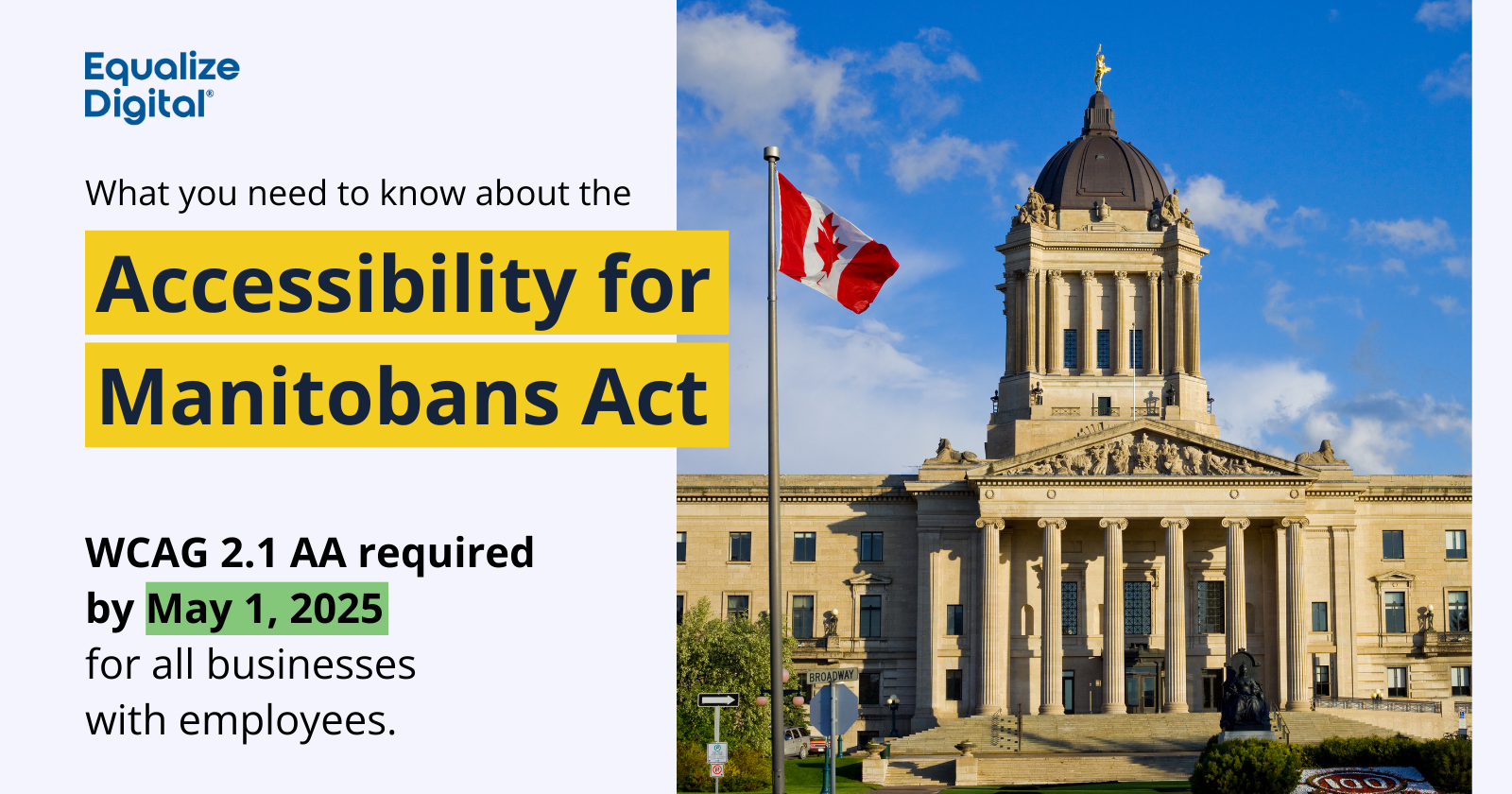
In December 2013, Manitoba took a significant step toward becoming a more inclusive province by enacting The Accessibility for Manitobans Act. As the second province in Canada to introduce accessibility legislation, following Ontario, Manitoba sets the stage for improving accessibility across public, private, and non-profit sectors.
The Accessibility for Manitobans Act aims to remove barriers that people with disabilities encounter in everyday life, helping to create an inclusive society where all Manitobans can participate fully and independently.
This article provides an overview of the Accessibility for Manitobans Act, its application to websites and other digital content, and its implications for WordPress websites. If you have any questions as you read through it or need help making your WordPress website accessible, get in touch. We’re happy to help.
What is the Accessibility for Manitobans Act?
The Accessibility for Manitobans Act is landmark legislation that aims to improve accessibility for people with disabilities by identifying, removing, and preventing barriers. The Act outlines five key standards that organizations must follow to achieve significant progress by 2023, a deadline set by the Manitoba government. These standards address different aspects of accessibility, ensuring progress across various sectors of life in Manitoba.
The act covers five areas: customer service, the built environment, employment, transportation, and most importantly for the web, information and communication.
Article continued below.
Stay on top of web accessibility news and best practices.
Join our email list to get notified of changes to website accessibility laws, WordPress accessibility resources, and accessibility webinar invitations in your inbox.
Manitoba’s Accessible Information and Communication Standard
The Accessible Information and Communication Standard Regulation under The Accessibility for Manitobans Act sets forth clear guidelines to remove and prevent barriers that exist digitally, in print, and through interactions with technology or people. The focus is on ensuring that Manitobans can access information barrier-free through websites, web applications, or other forms of communication.
WCAG 2.1 Compliance for Web Applications and Content
Organizations in Manitoba are required to meet the Web Content Accessibility Guidelines (WCAG) 2.1 Level AA as a minimum standard for web accessibility:
- Web Applications: Any web application launched or significantly updated after the Accessibility for Manitobans Act’s standard comes into force must meet WCAG 2.1 Level AA guidelines. This applies to any software application that runs on a web server and is accessed by users through a web browser. Web applications are vital for delivering services and information to the public and must be designed with accessibility in mind.
- Web Content: Any new or updated web content must comply with WCAG 2.1 Level AA guidelines. This applies to all content published after the standard becomes applicable. Organizations must ensure that older content that is essential for accessing their goods and services is updated to meet these guidelines.
These requirements also extend to intranet networks for public sector organizations, educational institutions, and libraries, ensuring that internal content is accessible.
Providing Accessible Formats and Communication Supports
Organizations must inform the public and employees that information is available through alternate formats or communication supports upon request. These could include accessible formats such as large print, audio recordings, or screen reader-compatible PDFs, especially for critical information like emergency procedures or public safety announcements.
When a request is made, organizations are responsible for consulting with the individual to determine the best support or format to remove any barriers. They must provide this at no additional cost.
Feedback Process
To support ongoing improvements in accessibility, organizations must develop a feedback process. This process allows users to provide feedback on the accessibility of the organization’s information and communication. Additionally, organizations must document any actions taken in response to this feedback and make those records available upon request.
Training on Accessible Communication
Organizations must provide timely and ongoing training to all employees, agents, and volunteers involved in web development, communication, or customer service. This training is designed to ensure that staff understand how to:
- Identify, prevent, and remove barriers to accessible communication.
- Provide accessible information or communication support when needed.
- Comply with Manitoba’s Human Rights Code, The Accessibility for Manitobans Act, and the Accessible Information and Communication Standard Regulation.
Training must be provided as soon as individuals are assigned duties that involve communication with the public or maintaining web content, and ongoing training is required whenever policies or practices are updated.
Documentation Requirements
Public sector organizations, educational institutions, libraries, and larger private sector entities (those with 50 or more employees) must document all their policies, measures, and practices related to accessible information and communication and make them publicly available to ensure transparency and accountability. This requirement could be met by including a link to an Accessibility Statement in your website footer.
Exceptions to the Standard
The Accessibility for Manitobans Act includes several exceptions to the requirements for providing accessible information or meeting WCAG 2.1 standards:
- If it is not technically feasible to meet the requirements.
- If the necessary technology is not readily available.
- If complying with the requirements would cause undue hardship to the organization.
- If the organization does not have direct control over the requested content, such as product labels or specific third-party web applications.
However, educational institutions are not exempt from requests for accessible educational materials. The institution must offer a comparable resource to ensure equitable accessif the specific support or format cannot be provided.
Who Needs to Comply with the Accessibility for Manitobans Act?
The Accessibility for Manitobans Act applies to various organizations, including the public sector, private businesses, and non-profit organizations. Compliance deadlines vary depending on the sector:
- May 1, 2023: Manitoba government agencies must comply.
- May 1, 2024: Public sector organizations, libraries, and educational institutions.
- May 1, 2025: Private sector businesses, non-profits, and small municipalities.
Every organization with one or more employees is required to follow the standards laid out in the Accessibility for Manitobans Act. This means that even small businesses, such as shops, restaurants, and service providers, must ensure their physical spaces and digital platforms are accessible to people with disabilities. The Accessibility for Manitobans Act Q&A PDF outlines the deadlines and who they refer to.
Learn More About the Accessibility for Manitobans Act
Recommended Reading
If you want to learn more about the Accessibility for Manitobans Act and how it might apply to your organization or your client’s websites, we recommend visiting the links earlier in the post. If you want to dive into the details, read the full text of the Accessibility for Manitobans Act on the Legislative Assembly of Manitoba website.
Get Legal Advice
If you have more questions about how this law might impact a website, contact an attorney who practices in Canada and specializes in accessibility law. They can provide the most accurate advice on how the laws pertain to your business or organization.
Start Making Your Website Accessible
The best way to ensure your website complies with accessibility laws is to start finding and fixing accessibility problems. Our WordPress plugin, Equalize Digital Accessibility Checker, scans unlimited WordPress posts and pages for free. It will help you find problems you can fix right away.
Want more guidance? Need developer support in fixing your WordPress website? Our accessibility audits and accessibility remediation plans provide access to expert accessibility specialists, WordPress developers, and real-world users of assistive technology to help you make your website fully WCAG-compliant.
We’d love to be part of your accessibility journey. Contact us today to get started.
